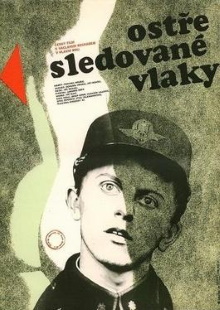I’ve never watched a film by director Jiří Menzel before this but I understand that he and this film in particular is part of what is known as the Czechoslovak New Wave. I confess to having a hard time connecting to the film even if I mostly understood what was going on in the story. It was only by exerting myself to link its events to many possible themes that I realized what its trying to convey and really started to enjoy it. This actually isn’t a difficult film to grasp and it is very good. It’s just that I couldn’t intuitively understand it as Czechs and perhaps other Europeans would be able to.
The young Miloš Hrma starts work as a dispatcher at a small railway station in occupied Czechoslovakia, so proud of his new uniform that he doesn’t take off his cap even when he goes to sleep. The senior dispatcher Hubička shows him how things are done but is a lecher who teases him about his girlfriend Máša and has sex with women in the station. The stationmaster is fat and pompous but seems to have little real authority. The head of the railway is a collaborationist who repeats German propaganda about victories even though the German army is losing ground. When Máša invites Miloš to stay over at her uncle’s house, he eagerly accepts. That night when Máša initiates sex, he is unable to perform and she gets angry at him. The next day he checks himself into a room at a brothel and attempts suicide but is saved by the staff. After he recovers he goes around asking everyone for advice on how to have sex. Later when SS soldiers detain but then spare him after seeing the scars on his wrists, he realizes that they are actually looking for Hubička who is secretly working for the resistance.
This is obviously an absurdist black comedy as it introduces Miloš by mentioning how one was a hypnotist who tried and failed to turn away German tanks in a prior invasion with his mental powers. Miloš himself is portrayed as being rather dim and unquestioningly obedient, though he is still smart enough to stop talking to Hubička about his girlfriend. His reaction to disappointing his girlfriend in bed seemed sudden and extreme to me and it took some doing for me to realize that his plight is a direct and pretty obvious metaphor for Czechoslovakia’s submission and weakness to Germany. Viewed in that lens, it makes perfect sense that Hubička, mischievous and yet unquestionably successful at seducing women, is the one actively working to sabotage the trains carrying German war material. It’s easy to see from there how the other characters must fit into the many different ways that Czechs deal with their country being occupied by the much more powerful Germany.
The problem is while I can understand this in the abstract, I simply do not know enough about Czechoslovakia to grasp all of the references and that limits how much I can appreciate this film. The character of the head of the railway who insists on strict adherence to the rules and unfavorably compares the useless Czechs to the Germans who are saving Europe is easy enough to place into context. But then how about the countess who visits the train station on a horse to leave instructions? Does she represent the Germans or the Czechs? Perhaps the absurdity of the aristocracy pretending that life is normal even though the country is under occupation. It’s hard to say without being more familiar with Czechoslovakia. It’s possible of course to work through this lack of knowledge, to read up on the facts and think through to the most likely interpretation, but as I noted, it’s not intuitive. You can’t really emotionally connect to a film in this way.
This means that on an intellectual level I can understand what the film is trying to do and I can even appreciate some of its dark humor. Knowing this, I can see why it’s considered as a great Czech film. But I feel too disconnected from its milieu to like it as much as it deserves to be.
